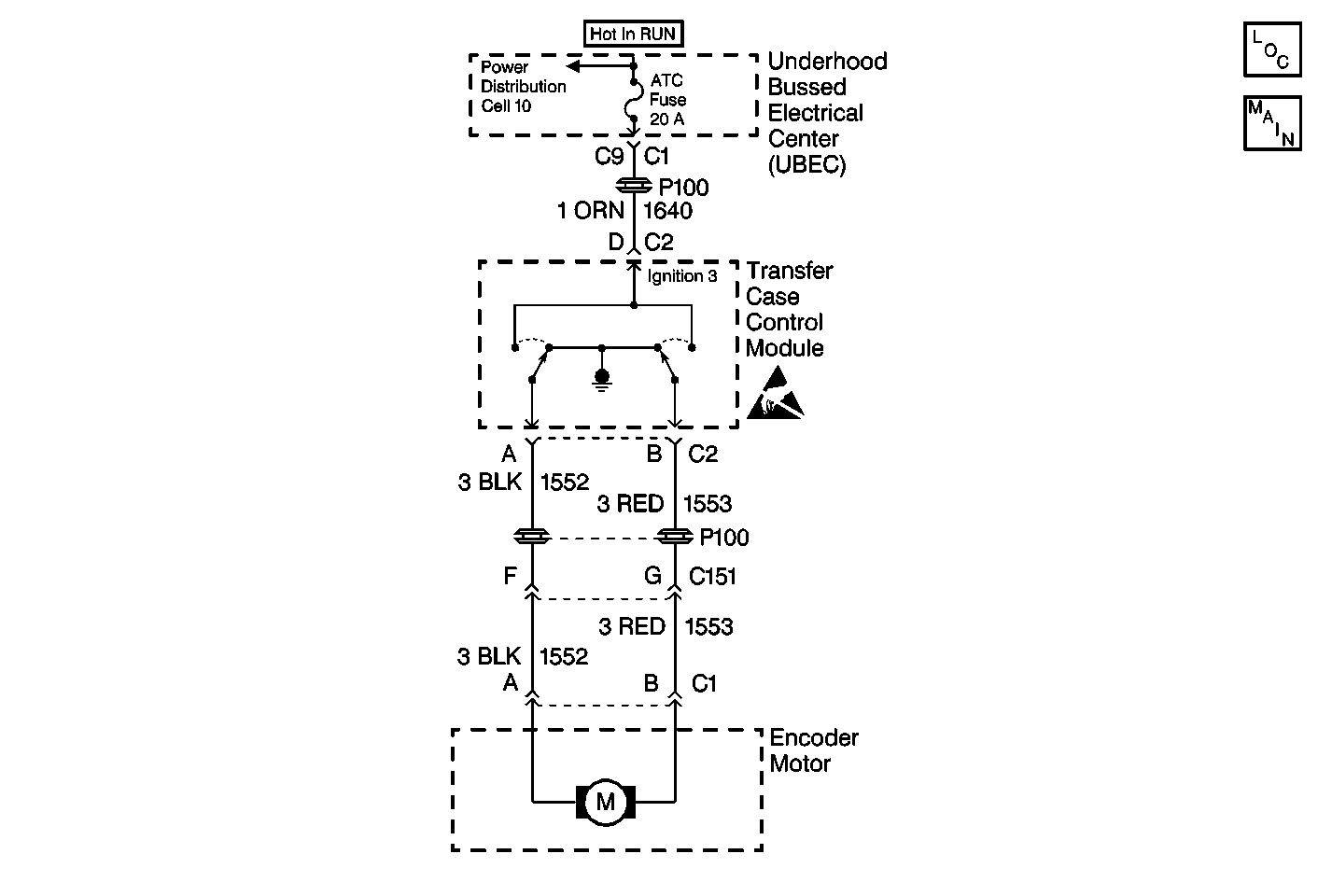
Circuit Description
The Transfer Case Motor is a bi-directional, permanent magnet, D.C. motor. When energized, (through circuits 1552, 1553, and the ground circuit 150 the module utilize for the motor control), the motor, through a series of gears, rotates a shaft which moves the mode and range forks to shift the Transfer Case between 4H, AUTO (Adapt), 2H, N, and 4L ranges.
This DTC detects a short to ground on CKTs 1552 and 1553.
Conditions for Setting the DTC
| • | The system will test the motor circuits: |
| • | First, the system checks for unwanted voltage. |
| • | Then, the system supplies voltage on one circuit and reads the voltage back on the other. |
| • | If the system detects a problem with the circuits, the DTC is logged. |
| • | The Auto Transfer Case (ATC) Control Module senses a low voltage return on circuits 1552 or 1553 when a high voltage is expected. |
Action Taken When the DTC Sets
| • | All shifting will be disabled. |
| • | The SERVICE indicator (4WD/AWD) lamp will be latched on for the remainder of the current ignition cycle. |
Conditions for Clearing the DTC
| • | The Auto Transfer Case (ATC) Control Module will clear the DTC if the condition for setting the DTC no longer exists. |
| • | A history DTC will clear after 100 consecutive ignition cycles without a fault present. |
| • | History DTCs can be cleared using a scan tool. |
Test Description
The numbers below refer to the step numbers on the diagnostic table.
-
Listen for an audible motor noise when the encoder motor operates. Command both the ON and OFF states. Repeat the commands as necessary.
-
Tests for a short to ground in the Motor Control A circuit.
-
Tests for a short to ground in the Motor Control B circuit.
-
Tests for a higher than normal resistance in the Motor Control A and B circuits through the module.
-
Tests for a short to ground in the encoder motor windings.
-
Tests for continuity across the motor circuit. Resistance readings vary depending on the location of the brush contact inside the motor assembly.
-
Tests Motor Feed A circuit for a short to ground.
-
Tests Motor Feed B circuit for a short to ground.
-
Tests Motor Feed A and B circuits for an open or high resistance.
Step | Action | Value(s) | Yes | No |
|---|---|---|---|---|
1 | Was the Transfer Case Diagnostic System Check performed? | -- | Go to Step 2 | |
Does the encoder motor turn ON and OFF? | -- | Go to Step 3 | ||
Is the resistance reading less than the specified value? | 10 K ohms | Go to Step 8 | Go to Step 4 | |
Connect a DMM between the Motor Control B circuit harness connector and ground at the transfer case. Is the resistance reading less than the specified value? | 10 K ohms | Go to Step 9 | Go to Step 5 | |
Connect a DMM between the Motor Control A and B circuit harness connector at the transfer case. Is the resistance reading greater than the specified value? | 2 ohms | Go to Step 6 | Go to Step 10 | |
|
Important: The transfer case Motor Control circuits have capacitors connected between their circuit and ground. When making resistance checks with a DMM allow the reading to stabilize (approximately 10 seconds) before making the final measurement (as the capacitor charges it can give the indication of a short circuit). Test terminals A and B at the transfer case side of the harness for a short to ground. Did the DMM indicate OL or open to ground on both circuits? | -- | Go to Step 11 | Go to Step 7 | |
Test the resistance across the motor circuit. Was the motor within the specified values. | 0.5-35 ohms | Go to Step 12 | Go to Step 11 | |
Was the condition found and corrected? | -- | Go to Step 13 | Go to Step 12 | |
Was the condition found and corrected? | -- | Go to Step 13 | Go to Step 12 | |
Was the condition found and corrected? | -- | Go to Step 13 | Go to Step 12 | |
11 | Replace the encoder motor. Refer to Motor/Encoder Replacement . Is the repair complete? | -- | Go to Step 13 | -- |
12 | Replace the transfer case shift control module. Refer to Transfer Case Shift Control Module Replacement . Is the repair complete? | -- | Go to Step 13 | -- |
13 |
Does the DTC reset? | -- | Go to Step 2 | System OK |
